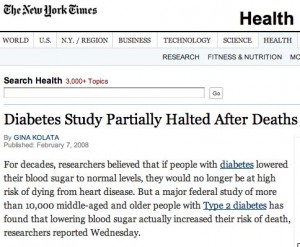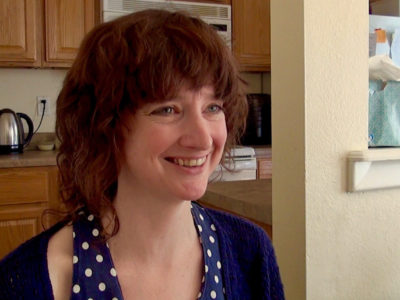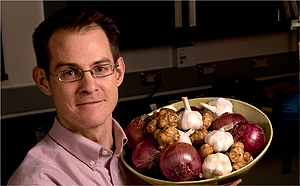When treating people with Type 2 Diabetes, doctors sometimes prescribe high doses of medications that lower blood sugar. The American Diabetes Association recommends good control of blood sugars in order to reduce the risk of heart attacks. But recently part of a large clinical diabetes study was halted after researchers found an increased death rate among those taking higher doses of blood sugar-lowering medication. The ACCORD trial, as it is called, is funded by several U.S. government agencies and the finding surprised many doctors. The surprise death rate has led some U.S. physicians to push an uncommon diet as a way to lower blood sugar. Features: Eric Westman, MD, Mary Vernon, MD, James Felicetta, MD. Shelley Schlender reports from Phoenix, Arizona. First Broadcast on Voice of America.
As if having diabetes isn’t hard enough, it increases the likelihood of other ailments, such as heart attacks. Most diabetics could reduce these risks if only they kept their blood sugars low through exercise and a healthy diet. Since most don’t, U-S, doctors fill the gap with blood sugar lowering drugs. But a recent study indicates that very high doses can increase heart attacks. This is leading some physicians to say that the U-S should focus less on medication, and more on diabetic diets.
NARR
When people want comfort food, they often go for pasta,, tortillas, rice, bread, French Fries, donuts, chips. But in a diabetic, these high carbohydrate foods can raise blood sugars to dangerous levels, leading to blindness, kidney problems, and heart attacks. A small percentage of diabetics, called Type I, must control blood sugars with insulin injections. However most diabetics are Type II, and their bodies make plenty of insulin. Their blood sugars could be normal, if they watched their diets. At the VA Medical Center in Phoenix, a 60 year old Type II diabetic says that isn’t easy.
BARADO
I used to eat honey buns, Ice cream, candy bars.
Even with diabetes medications, Richard Barado’s blood sugars were too high. So, a few years back, he enrolled in a nationwide study called ACCORD. Everyone in the study got nutritional advice, based on guidelines from the American Diabetes Association. This often lowered blood sugars . . . but not enough. To push them down to normal, some patients got extra doses of blood sugar lowering medicine. According to Dr. James Felicetta who led the ACCORD study in Phoenix, that meant a lot of drugs
FELICETTA
We pretty much had to throw everything we had including the kitchen sink at these patients. So many of these patients were on virtually every type of medication that we can treat diabetes with.
NARR
In February, ACCORD canceled this part of the study, because in the group getting more medicine, more people died. Richard Barado:
BARADO
It shook me, because, my father died at 50 years old, my brother died at 49, and I’m 60 and I want to live longer. I’m not ready to go.
NARR
Barado now takes only standard medicine doses. For lunch, he eats half a sandwich and skips the honey bun. His blood sugar levels are lower. But if they never drop to normal, Dr. Felicetta suspects it’s better to live with it. After all, eating right is hard, and too much medication is risky.
FELICETTA
If you have older Type II patients with high risk of cardiovascular disease, you can overdue the treatment.
NARR
But at a conference of the Nutrition and Metabolism Society in Phoenix, Eric Westman, a physician and researcher from Duke University, worries that the ACCORD study will lead doctors to give up on healthy blood sugars.
WESTMAN
From the initial reports from the experts, I’m concerned that they’re missing the boat. The glucose control needs to be tight. In fact, it needs to be normal in Type II diabetics.
Since using too many drugs is dangerous, Dr. Westman wants large studies, such as ACCORD, to look more closely at diet.
WESTMAN
When you take people with diabetes and put them on the right diet that controls diabetes, you can actually achieve normal blood sugars without medication
But Dr. Westman says that one of the most effective diets is out of favor with the American Diabetes Association. The ADA recommends six to 11 servings of bread, pasta, cereal or rice.. A diabetes expert from Kansas, Dr. Mary Vernon, says that’s too many.
VERNON
The ADA says 50% of your caloric requirement should come as carbohydrates. So if you’re eating 2,000 calories a day, you do the math. That’s a lot of carbohydrate. No wonder people need more and more medication to control their blood sugar.
NARR
In their clinics, Doctors Westman and Vernon have diabetics eat less than 10 percent of calories as “carbs.” This often lowers blood sugars so dramatically; diabetics stop taking blood glucose lowering drugs. Dr. Vernon says the diet also reduces heart attack risk.
VERNON
I’m talking things like cholesterol, triglycerides and HDL. All normalize and approach or become in the recommended range.
As for what her patients eat, Dr. Vernon recommends lots of olive oil, avocados, nuts, cream, eggs and bacon. No pasta, sugar, bread or rice, but plenty of low carbohydrate vegetables.
VERNON
Leafy greens, salad vegetables, and maybe a cooked vegetable like broccoli or cauliflower, that’s the sum total..
Whether it’s 10 percent or 50 percent carbohydrate, Dr. Felicetta says most diabetics won’t keep up a diet.
FELICETTA
A doctor that relies on exercise and diet to treat diabetes will have a very large proportion of uncontrolled patients. I wouldn’t want to say anything to minimize the importance of diabetic medication.
Because low carb diets work, Dr. Vernon says her patients DO stick with it. So that more health professional understand this approach, Dr. Westman and other members of the Nutrition and Metabolism Society are urging the ADA to formally recommend low carb diets. At their annual meeting in June, the ADA will hold a session on the ACCORD study. They plan to focus the discussion on drugs, not diet.








2 comments for “Diabetes – Too Much Medicine May Kill You”